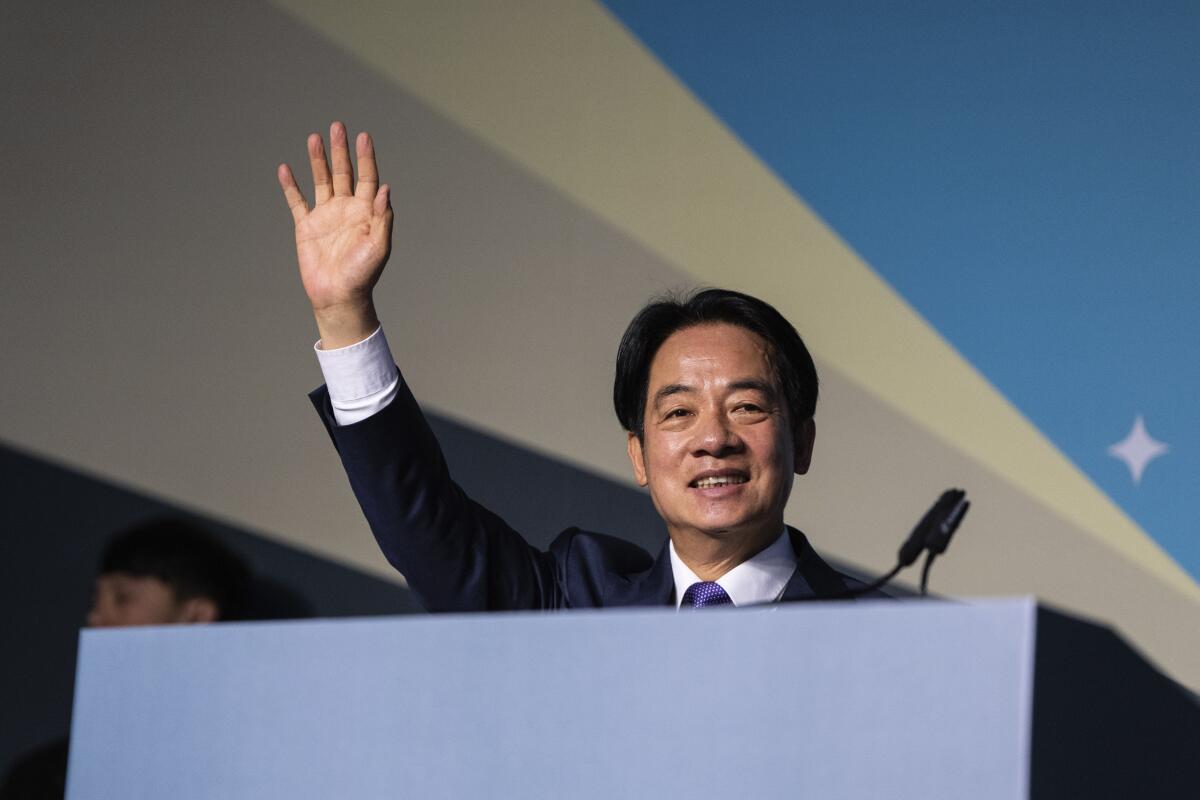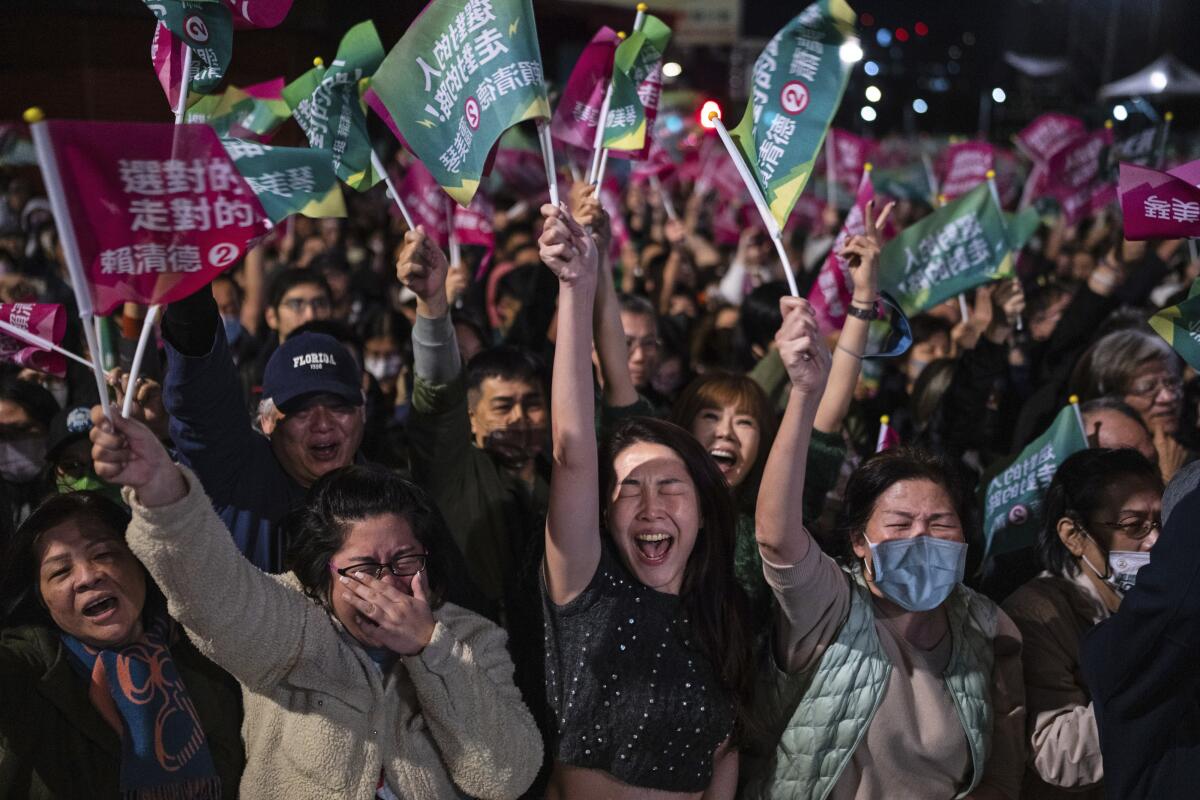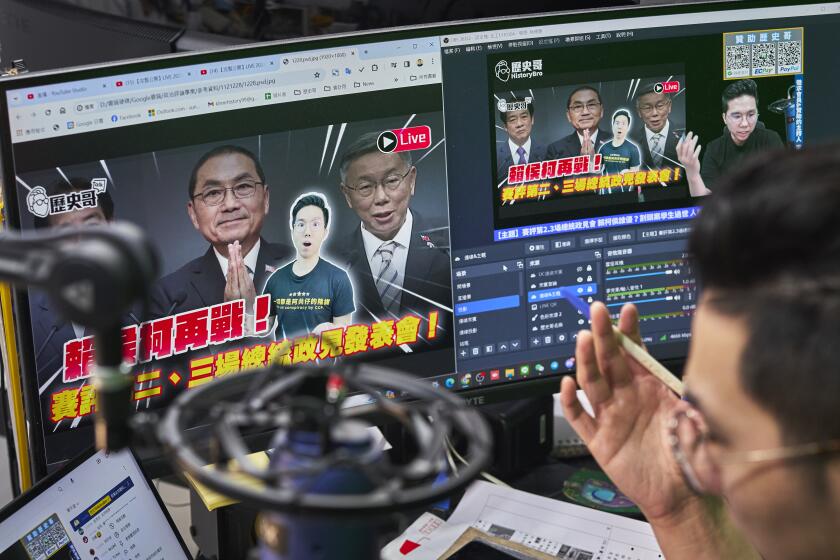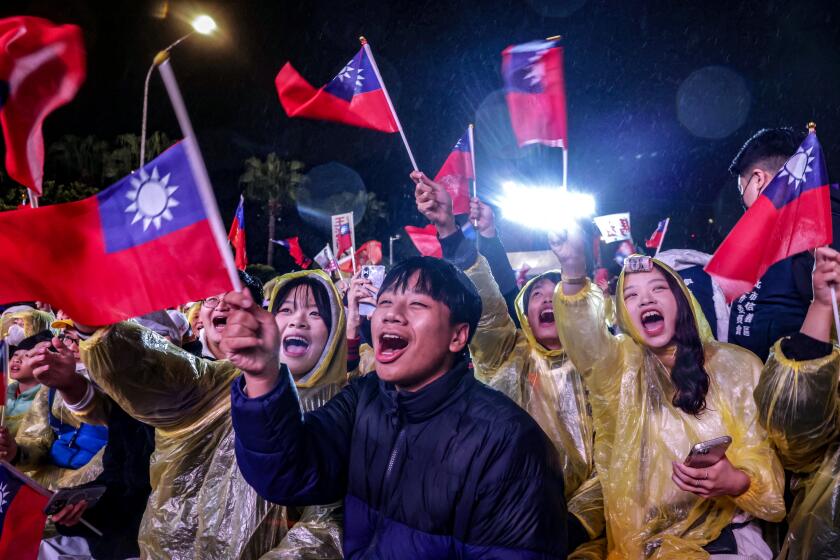Taiwan’s new president-elect is a historic choice — and a cause for more tension with China

TAIPEI, Taiwan — The election Saturday of Lai Ching-te as Taiwan’s next president represents a historic achievement for his independence-leaning party — but is certain to increase tensions with China and challenges for the U.S. in one of the world’s most worrisome hot spots.
Lai, the candidate of the ruling Democratic Progressive Party, won a tight race with 40.1% of the vote, beating out two rivals who favor closer ties with Beijing. A third consecutive presidential term for any party is unprecedented in Taiwan and indicates that, for at least a plurality of voters, antipathy toward mainland China outweighs growing discontent over the economy and other domestic problems.
But as packed crowds of supporters reveled in the Democratic Progressive Party’s win outside its headquarters here in Taipei on Saturday night, Lai struck a sober tone in his victory speech, seemingly mindful of the challenges facing him over the next four years, including the island’s standoff with China, a divided legislature and an increasingly disaffected populace.
“The elections have told us that the people expect an effective government as well as strong checks and balances. We fully understand and respect these opinions from the public,” he said. “We will use exchanges to replace obstructions, dialogue to replace confrontation and confidently pursue exchanges and cooperation with China.”

But the election of another Democratic Progressive Party president will likely spur a strong reaction from Beijing, which considers Taiwan a part of its territory and has denounced Lai as a separatist who will drive the island of 23 million people to war with mainland China. Analysts expect Beijing to express its displeasure by stepping up displays of its military muscle and economic leverage, which might demonstrate its resolve but add to the risk of an inadvertent clash that could spiral out of control.
“It sees these pressure tactics, especially the military provocations, as deterrence, showing them [that] if you make the wrong move, we will fight,” said Michael Cunningham, a research fellow at the Heritage Foundation’s Asian Studies Center. “Beijing knows it’s not normal for the incumbent party to hold onto power for this long. It’s going to try to make sure Lai has only one four-year term.”
On Saturday, Lai, who is 64, reiterated his intention to maintain the status quo with China and preserve peace in Taiwan. But he has strongly promoted the idea of Taiwanese sovereignty in the past, and Beijing remains highly mistrustful of him and his party.
Disinformation is exacerbating political polarization and mistrust amid a tight presidential race in Taiwan, where tension with China is running high.
Many analysts also see his election win as only a qualified triumph largely attributable to his party’s traditional support base and missteps by the other candidates.
The opposition parties together accounted for about 60% of the vote, a sign of growing fatigue with the Democratic Progressive Party, or DPP, which could hinder Lai’s ability to tackle international and domestic problems. The lack of a party majority in the 113-seat parliament, the legislative yuan, will also make it more difficult for the new president to advance his agenda.
“This is going to be a really tough administration,” said Lev Nachman, professor of political science at National Chengchi University in Taipei. “Now they have to deal with a very divided society and a very divided legislative yuan.”

Lai’s election comes at a highly fraught juncture for the U.S., China and Taiwan. The self-ruled island’s sovereignty has become a flashpoint in the deteriorating relationship between the two superpowers, igniting concerns of a potential military conflict that could quickly expand to the broader Asia-Pacific region. That’s made maintaining peace in the Taiwan Strait, already a delicate balancing act, a harder task for the next administration in Taipei.
Chinese President Xi Jinping has warned that Taiwan must eventually be unified with the mainland, by force if necessary. Cross-strait relations have grown strained during the eight years under outgoing Taiwanese President Tsai Ing-wen, who has adopted a more confrontational stance toward Beijing while strengthening ties with other democracies, especially the U.S.
Tsai, with whom Beijing has refused to engage, is stepping down because of term limits.
The U.S. has long adhered to a policy known as “strategic ambiguity.” It acknowledges that China lays claim to the self-ruled island, but does not endorse it. Nor does it recognize Taiwan as a country, but Washington maintains governmental communications with and sells defensive arms to Taipei. U.S. officials decline to explicitly state whether they would offer military assistance in the event of conflict, both to deter China from launching an attack and Taiwan from formally declaring independence.
Passions on both sides of Taiwanese politics are as intense as Democrat versus Republican, sometimes leading to conflicts in families and workplaces. And that has carried over to the U.S. Even some who have lived here for decades are obsessed.
But in recent years, Beijing has accused the U.S. of shifting away from the policy and quietly emboldening Taiwan to pursue independence. When then-House Speaker Nancy Pelosi (D-San Francisco) visited Taipei in August 2022, Chinese officials responded by launching military drills unprecedented in scale around Taiwan and suspending imports of some fruits and fish.
That military and economic pressure has continued with more naval and air patrols and halts of preferential tariffs on Taiwan trade last month.
Though Lai was the longtime front-runner, his lead in the polls narrowed considerably in the weeks before the election. He campaigned on the assurance that he would continue Tsai’s trajectory of bolstering Taiwan’s international ties and defense capabilities while maintaining the status quo.
“They have just proven that it’s possible to break the eight-year curse,” Wen-ti Sung, a political scientist at Australia National University, said of the Democratic Progressive Party’s third consecutive presidential win. “They can signal to Beijing that they have staying power.”
Breaking News
Get breaking news, investigations, analysis and more signature journalism from the Los Angeles Times in your inbox.
You may occasionally receive promotional content from the Los Angeles Times.
Chinese officials have castigated Lai, a former doctor, as a dangerous separatist who could drag Taiwan into a devastating war. Lai’s description of himself in 2017 as a “pragmatic worker for Taiwanese independence” has helped fuel that characterization, giving ammunition to Beijing and the opposition parties to label him as a politician liable to provoke China’s military ire.
The Chinese Nationalist Party, better known as the Kuomintang or KMT, also framed the election as a choice between war and peace. Its candidate, Hou Yu-ih, a 66-year-old former police chief and current mayor of New Taipei City, stressed his dedication to “law and order” and said he would seek to improve relations with Beijing but does not support unification.
The KMT, which fled mainland China after losing the Chinese civil war in 1949, has largely fallen out of favor with the younger generations, the majority of whom now consider themselves more Taiwanese than Chinese. The island’s oldest political party has struggled to attract young voters and shake its image as the pro-China choice.
But there have been signs that voters are also unhappy with the ruling DPP and eager to express their discontent, especially over stagnating economic growth.
A new Taiwanese Netflix drama envisions a world of politics with women at the forefront — and tensions with mainland China conspicuously absent.
In 2022, the KMT won a broad swath of victories in Taiwan’s local elections, prompting Tsai to step down as chairperson of the DPP. A November poll by the Taiwan Public Opinion Foundation showed 57.4% of respondents were dissatisfied with the DPP’s governance, including both its approach to cross-strait relations and the economy.
That frustration fueled an early wave of unexpected support for Ko Wen-je as a third-party alternative, particularly among Taiwanese disenchanted with the two main political parties. The 64-year-old former trauma surgeon served as Taipei mayor for two terms before running for president this year with the Taiwan People’s Party, which he founded.
He attacked the DPP for being too adversarial toward Beijing and the KMT for being too acquiescent. However, his momentum dwindled after a failed attempt to form a joint ticket with Hou against the DPP.
Beijing’s response to another DPP president will set the tone for its shaky relationship with the U.S., which has seen a slight thaw since President Biden and Chinese leader Xi convened in November for their first meeting in a year. The two agreed to resume military dialogues that were halted after Pelosi’s trip to Taiwan. Biden reiterated that U.S. policy on the island had not changed, while Xi reportedly reassured Biden that he did not imminently plan to exercise military force.
“The momentum behind an improvement in U.S.-China relations is ongoing,” said Amanda Hsiao, senior China analyst at International Crisis Group. “That will incentivize China to adopt slightly more discreet or ambiguous forms of pressure. But pressure will definitely be there.”
More to Read
Sign up for Essential California
The most important California stories and recommendations in your inbox every morning.
You may occasionally receive promotional content from the Los Angeles Times.














